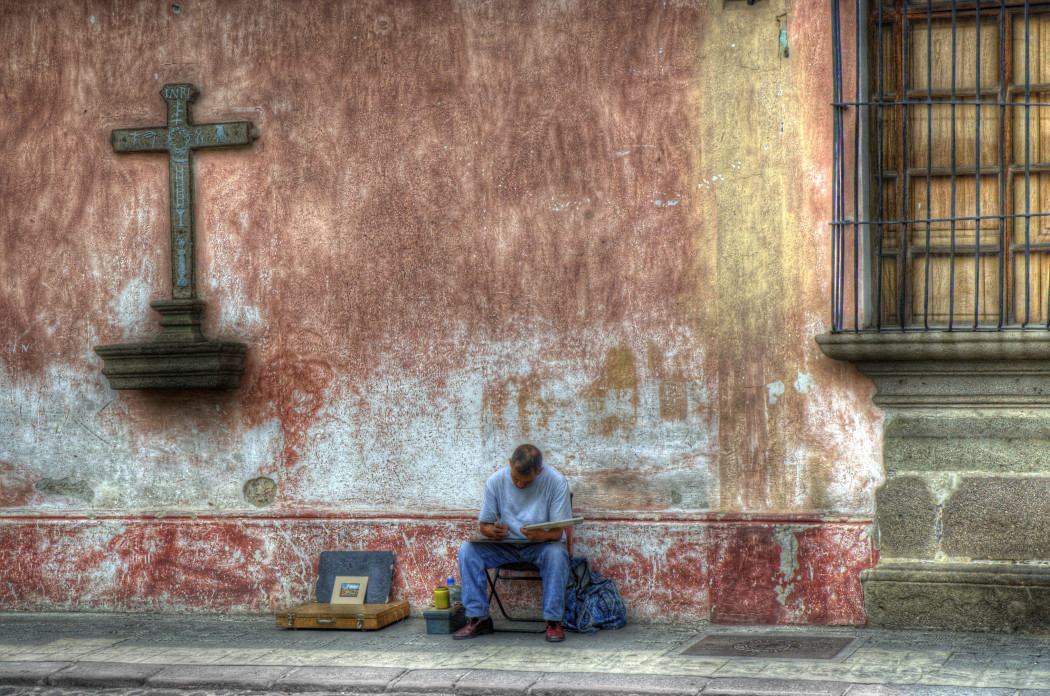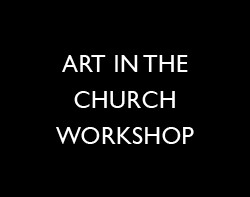
(Flickr: DaveWilsonPhotography).
There can often be two schools of thought when it comes to pastoral care of artists. The first says that artists should be treated just like any other group within a religious tradition. It should not be assumed that the actor will jump at the chance to direct the church nativity play, or that the dancer will feel rejected if she is not invited to dance liturgically.
The second school of thought says that artists do have particular needs which are often ignored by religious communities. It may be assumed that they’re willing to volunteer skills for which they deserve to be paid. In addition, artists may find creative liturgies easier to enter into, and/or may want to be given the opportunity to share their creative gifts with the congregation in worship. Finally, practicalities like evening-and-weekend work schedules may prevent some artists from attending many church activities.
Many artists participate in their faith communities just as other members do, and would resist any effort to treat them differently. Other artists love the opportunity to participate in their faith communities specifically as artists, and would feel excluded if this type of participation was rejected. Both approaches can also mix within the same person: for example, a folk singer may prefer to attend a traditional liturgy complete with Latin schola, and may resist any invitations to attend a contemporary “folk Mass”. However, she may be happy to break out the guitar during the church’s annual fundraiser.
One approach to the pastoral care of artists is to let them set the tone. If they present themselves at church as a member of the congregation, treat them like any other of the congregation. If, however, they offer to participate as artists, or reveal pastoral needs specific to their profession, then adjust one’s pastoral approach accordingly.
There are situations, however, in which it would be wise for the Church to reach out to artists where they exist as artists, perhaps not even knowing that the Church takes an interest in them. For example, when I was an acting student, I was dealing with heavy challenges to my faith, but did not have any older Christian theatrical mentors or chaplains to guide me, and saw several of my fellow classmates lose their faith. (I, instead, left acting for a while.) A pastor who had decided to take drama students under his care might have helped us discern how our faith could be lived through theatre, contrary to the secular ideologies which pressured us to conform.
During my recent visit to Los Angeles, I spoke with both clerical and lay media professionals about their assessment of the spiritual needs of Hollywood’s Christians. Many of them spoke of the need for a chaplaincy and spiritual centre, which could help walk actors and others through the ethical difficulties of working in entertainment (to disrobe or not to disrobe?), teach them to pray (instead of surrendering the field to New Age spiritualities and pop psychology), and provide community, solidarity, and pastoral support in times of need.
We need to be aware of the artists within our churches, and their particular concerns, needs, and gifts. But we also need to go out to the artists who aren’t in our churches, but would like to be – or who just need someone to walk with them in their artistic life. We need workers to go out into the harvest, and work beside the workers in the field of the imagination. We need shepherds to go out into the wilderness, and lead the sheep home.[1]
What types of outreach and support would you like to see in a chaplaincy for artists?
Cole Matson is a third-year PhD student in the Institute for Theology, Imagination & the Arts. He is exploring the possibility of a truly Eucharistic theatre by putting the work of Jerzy Grotowski in dialogue with John Paul II.
__________________
1. I am not thinking simply of clergy, or ordained ministers. I am thinking of anyone able to take a trusted guiding role in the life of an artist. Ordained ministers and pastoral workers are, of course, also needed.
Image credit: Dave Wilson. Image shared under Creative Commons Attribution-NonCommercial-NoDerivs 2.0 Generic licence.






The church I attend promotes forming smaller sub-groups within the church in lieu of traditional Sunday school. These “Community Groups” meet regularly, normally at a home, and discuss the latest message delivered at our worship service. The primary focus of these groups is building relationships with each other and working together to serve the local community; as our community group pastor promotes it, doing life together.
As the resident artist at our church, I am working to develop a community group for artists in the church. Our meetings are mainly comprised of a voluntary peer critique that tackles everything from material selection and execution to expressing our faith in our work. I believe that is a model of the artists pastoral role you propose.
As artist in faith, we need less of a leader to follow and more of a shepherd to advise and support us in our work; a pastor of the arts.
Cole, during your recent visit to LA ….how was your conversation with `Hollywood connect’? ((did you have…..?)
http://hollywoodconnect.com/about
How about
http://www.a-e-m.org/
That’s just the first two…off the top of my head….//Steve
This is a tough one for me. I have gone all around with what is a perfect solution. Ultimately, I suppose it is a personal one, both for the artist and for the pastor.
For the artist, they may need to be self aware enough to know that they are having spiritual difficulty and then be willing to take the step to seek a shepherd if one is not already a part of their life.
For the pastor, they have to be self aware enough to know, while preaching is an art, their limitations in relating.
I still fall more to the side that the artist should not be treated any differently than anyone else. From an artistic perspective I think this because I think art is about life. And if you don’t have a life, how much art will you have? So the needs and lessons of life are pretty universal. Life is the well the artist draws from to create.
This is not to say artists aren’t a peculiar breed. That certainly warrants a unique approach and a gifted shepherd. As such I have to be thankful that, in my early days on the tail end of the Jesus movement and even into the 90s, God provided groups like JPUSA and L’Abri. When I was constantly confronted by Christians who frowned upon all the things I was interested in and wanted to do as an artist, God used these people to help me find rest and encouragement, as well as stay centered.
May God continue to give us shepherds. And may we seek them out, preferably before they are really needed.
Joe
Artists “abide in the “liminal-luminal” space between Heaven and earth”… because they are so spiritually intuitive they are very difficult to constrain within the Western rationalism that has been the pervasive influence underpinning the European and North American church culture….
Artists are a praise to God! They lead in that fresh, spontaneous expression of BEAUTIFUL! They exude what it is to be FULLY ALIVE! They express the “Halals to God”… The intimate praises where He abides….And so they are naturally diminished…outcast…misunderstood….and consequently, often the deeply wounded ones among us…
I have been “young and now am older””… I have and am a spontaneous praise to God in the earth…but now I am wiser, and have come through the healing process because of gentle, tender-hearted ones who have over the years taken me under their wing and loved me simply for who I am… I have “come through” not necessarily because these loving ones have understood my multi-faceted nature or my capacity for depth of pain and birth of gladness…but I have found my way because they have accepted me, nurtured and loved me deeply, receiving the delight of my dance, the heart of my song, and the inspiration of my pen and paint.
My life is a work of Joy…an expression of praise through the Holy Spirit …
Now I bring under my wing those “20 -30 something’s” that are trying to reconcile for themselves what it is to be alive and responsive to God while charting the constraints that they face in the formal church…
Wise is the gentle shepherd who recognizes the gift on the creative… the depth of heart within them, their positioning within the body of Christ, and then seeks out the opportunity to either have them lead the procession or whisper the beauty that delights the heart of God….
And discerning is the shepherd who can also bind up the wounds of the these vulnerable ones and allow the love of Jesus to flow freely and without measure in and through their lives…
Together we are a beautiful mosaic of life… together we are a full expression of the heart of God… ~sh